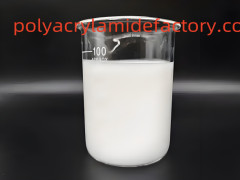Why Is Anionic Polyacrylamide Essential for Sludge Management?
anionic polyacrylamide emulsion is widely used in various industries for its outstanding performance in sludge dewatering
processes. Its ability to improve the efficiency of water treatment systems,
specifically in municipal and industrial wastewater treatment plants, has made
it a go-to solution for managing sludge. The polymer’s unique properties allow
it to bind with suspended particles in the sludge, facilitating their removal,
thus helping in reducing the overall volume of wastewater.
1. Improved Flocculation for Enhanced Dewatering
The primary role of anionic polyacrylamide emulsion in sludge dewatering is its excellent flocculation properties. By promoting the aggregation of fine
particles into larger, easier-to-remove flocs, it significantly enhances the
efficiency of the dewatering process. This leads to the separation of water from
sludge, creating dry cakes that are easier to manage, transport, and dispose of.
This process is critical in wastewater treatment plants as it helps reduce the
volume of waste generated, making the overall treatment process more
sustainable.
2. Cost-Efficient Sludge Treatment
Using anionic polyacrylamide emulsion for sludge dewatering not only improves the efficiency of the process but also reduces operational costs. The polymer
helps to maximize the performance of dewatering equipment, such as centrifuges,
belt presses, and filter presses, by improving the overall quality and yield of
the dewatered sludge. Additionally, the reduced volume of sludge results in
lower disposal costs, as there is less material to manage and dispose of.
3. Environmental Benefits of Sludge Reduction
One of the key advantages of using anionic polyacrylamide emulsion in sludge dewatering is its contribution to environmental sustainability. The reduced
sludge volume minimizes the need for landfilling, reducing the environmental
footprint of wastewater treatment processes. Furthermore, the effective
separation of solids from water helps in reclaiming clean water, which can be
treated and reused, leading to resource conservation in water-scarce
regions.
4. Versatility in Various Industrial Applications
The application of anionic polyacrylamide emulsion is not limited to municipal wastewater treatment. It has proven effective in a wide range of
industrial applications, including paper mills, mining operations, and food
processing plants. In these industries, the emulsion helps treat industrial
wastewater, improving the quality of effluent and ensuring compliance with
environmental regulations. Its versatility makes it a popular choice for sludge
management in many sectors.visit https://www.polyacrylamidefactory.com/product/oilfield/ .
processes. Its ability to improve the efficiency of water treatment systems,
specifically in municipal and industrial wastewater treatment plants, has made
it a go-to solution for managing sludge. The polymer’s unique properties allow
it to bind with suspended particles in the sludge, facilitating their removal,
thus helping in reducing the overall volume of wastewater.
1. Improved Flocculation for Enhanced Dewatering
The primary role of anionic polyacrylamide emulsion in sludge dewatering is its excellent flocculation properties. By promoting the aggregation of fine
particles into larger, easier-to-remove flocs, it significantly enhances the
efficiency of the dewatering process. This leads to the separation of water from
sludge, creating dry cakes that are easier to manage, transport, and dispose of.
This process is critical in wastewater treatment plants as it helps reduce the
volume of waste generated, making the overall treatment process more
sustainable.
2. Cost-Efficient Sludge Treatment
Using anionic polyacrylamide emulsion for sludge dewatering not only improves the efficiency of the process but also reduces operational costs. The polymer
helps to maximize the performance of dewatering equipment, such as centrifuges,
belt presses, and filter presses, by improving the overall quality and yield of
the dewatered sludge. Additionally, the reduced volume of sludge results in
lower disposal costs, as there is less material to manage and dispose of.
3. Environmental Benefits of Sludge Reduction
One of the key advantages of using anionic polyacrylamide emulsion in sludge dewatering is its contribution to environmental sustainability. The reduced
sludge volume minimizes the need for landfilling, reducing the environmental
footprint of wastewater treatment processes. Furthermore, the effective
separation of solids from water helps in reclaiming clean water, which can be
treated and reused, leading to resource conservation in water-scarce
regions.
4. Versatility in Various Industrial Applications
The application of anionic polyacrylamide emulsion is not limited to municipal wastewater treatment. It has proven effective in a wide range of
industrial applications, including paper mills, mining operations, and food
processing plants. In these industries, the emulsion helps treat industrial
wastewater, improving the quality of effluent and ensuring compliance with
environmental regulations. Its versatility makes it a popular choice for sludge
management in many sectors.visit https://www.polyacrylamidefactory.com/product/oilfield/ .
Puntos agregados!
Posts relacionados
Comentarios

Cargando comentarios espera un momento...
Para poder comentar necesitas estar Registrado. O.. ya tienes usuario? Logueate!
Tu comentario fue agreado correctamente


 Recomendar
Recomendar

